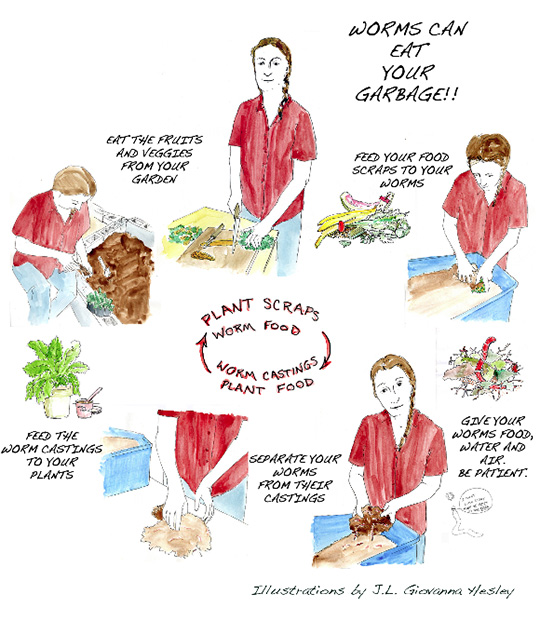 We gardeners are designers, nurturers, and defenders of little island ecosystems — gardens — that are totally different than our surrounding native biomes. We compost our household garbage to make an amendment for the soil; plant our favorite non-native plants; stress about watering; admire each others’ efforts and brag about our own; and compete for the resulting food with our local garden-eating critters. We wait; we watch; we organize our seeds in anticipation.
We gardeners are designers, nurturers, and defenders of little island ecosystems — gardens — that are totally different than our surrounding native biomes. We compost our household garbage to make an amendment for the soil; plant our favorite non-native plants; stress about watering; admire each others’ efforts and brag about our own; and compete for the resulting food with our local garden-eating critters. We wait; we watch; we organize our seeds in anticipation.
I thoroughly enjoy the process as well as the harvest. And yep! It’s spring again, time to get the soil ready to be the anchor and the nourishment to the seedlings I’ve grown that are ready to set out. Here in Oracle, AZ, I’m pretty confident that freezing nights have passed and that by the end of April, soils will be warm enough for great hot-season plant growth. Tomatoes, chilis, beans, eggplants, squash, melons, Malabar, and Egyptian spinach plus a palette of herbs, and some new experiments are on the menu this summer.
Plants need pretty much the same things that we need for vibrant health: a wide range of available nutrients, the right combination of oxygen and carbon dioxide, sunlight, a diversity of microbes, and a comfy place to put down roots. We humans get our nutrients from our food and supplements; plants get theirs from the soil and soil amendments.
Worm castings, aka worm compost or worm poop, are to the plant what probiotics are to our gut. The microbial richness of castings are critical to the cycling of nutrients in the soil for use by the plants, much as our gut bacteria help us use the vitamins and minerals in our food. Add a little mineral-rich rock dust and you’re on the road to a great organic garden that will yield vitamin- and mineral-rich produce. If soils lack nutrients, so will your produce.
I grow worms, harvest their castings, and sell them both at a Tucson Farmer’s Market. One of my signs says “Don’t garden without worm castings!” It can be your first step in becoming an organic gardener and nurturing the earth. Growing organically is truly a total systems approach to life. Simply stated, we learn from the cycles of nature and apply those cycles to our gardens. For example, we ‘drop our leaves’ by composting our organic waste and returning it to the soil. We amend our garden soil with compost so that the many of the microbialy driven nutrient cycles supply our plants with minerals needed for growth.
I sometimes feel that the list all of the benefits of using worm castings sounds too good to be true: adds beneficial microbes to the soil; adds nutrients; has disease suppression qualities; adds organic matter and water-holding capacity to the soil; will not burn plants; odor-free, safe and easy to use; and has plant growth hormones that enhance plant root growth. But the body of science backing up the claims about worm castings continues to grow, as do the hands-on experiences of people who use them. I get return customers who have converted to using castings in their gardens, and emails such as this one that arrived just yesterday: “FYI: I used the castings you gave me in one pot of tomatoes. Those tomatoes are 4x the size of any others. That makes me a believer.”
Interested in getting started with your own worm composting? I have a couple ‘wormshops’ coming up in April in the Tucson area – just check my website for details. There is also a large amount of info on the web about composting with worms, such as redwormcomposting.com. Also, many communities have their very own vermiculturists (worm growers) who can provide worms, instruction on composting with worms, and castings. If you don’t want worms, ask the grower if they might want your food scraps for their worms. I trade food scraps for worm compost, aiming for zero organic waste. Support your local vermiculturist whenever you can. If there is no local source, you can often find bags of worm castings at nurseries, and they can be ordered online as well.
Here’s a cartoon of the whole vermicomposting process using a small, indoor bin – but you can also do it outside in a pile.
I’ve spent close to 10 hours in the past two days with a film crew who is making a short film about Biosphere 2. I was interviewed about the experiences that I had building the closed ecological system, and about living inside for two years in the early ’90s. My experiences with the living systems in Biosphere 2 caused a paradigm shift in my thinking about gardening. I had become a gardener of the atmosphere as much as a gardener for food, finally viewing myself and my actions as a part of the whole earth system.
One of my dreams is a re-purposing of all of those weinermobiles out there to become wormmobiles to SPREAD THE WORM! Here’s to our collective vibrancy, the health of the planet and the positive impact that we can all have with directed effort!
Learn more:
http://cwmi.css.cornell.edu/vermicompost.htm Don’t miss this video, “Vermicompost: Living Soil Amendment” from Cornell. They’ve done a tremendous amount of research about worm compost.
http://www.youtube.com/watch?v=GEtl09VZiSU Video of my hero, Dr. Elaine Ingham, discussing the soil, the soil food web, and plant growth, plus a bit about the collapse of civilization through poor agricultural practices.
http://www.wormwoman.com All things worm – how to start a worm bin, lots of resources, worm e-zine by the world’s foremost “spread the worm” advocate Mary Apelhof whose book “Worms Eat My Garbage” is the best beginner’s guide to worm composting.
http://www.bae.ncsu.edu/topic/vermicomposting/index.html North Carolina State University is a leader in research, teaching, and use of worm compost.



